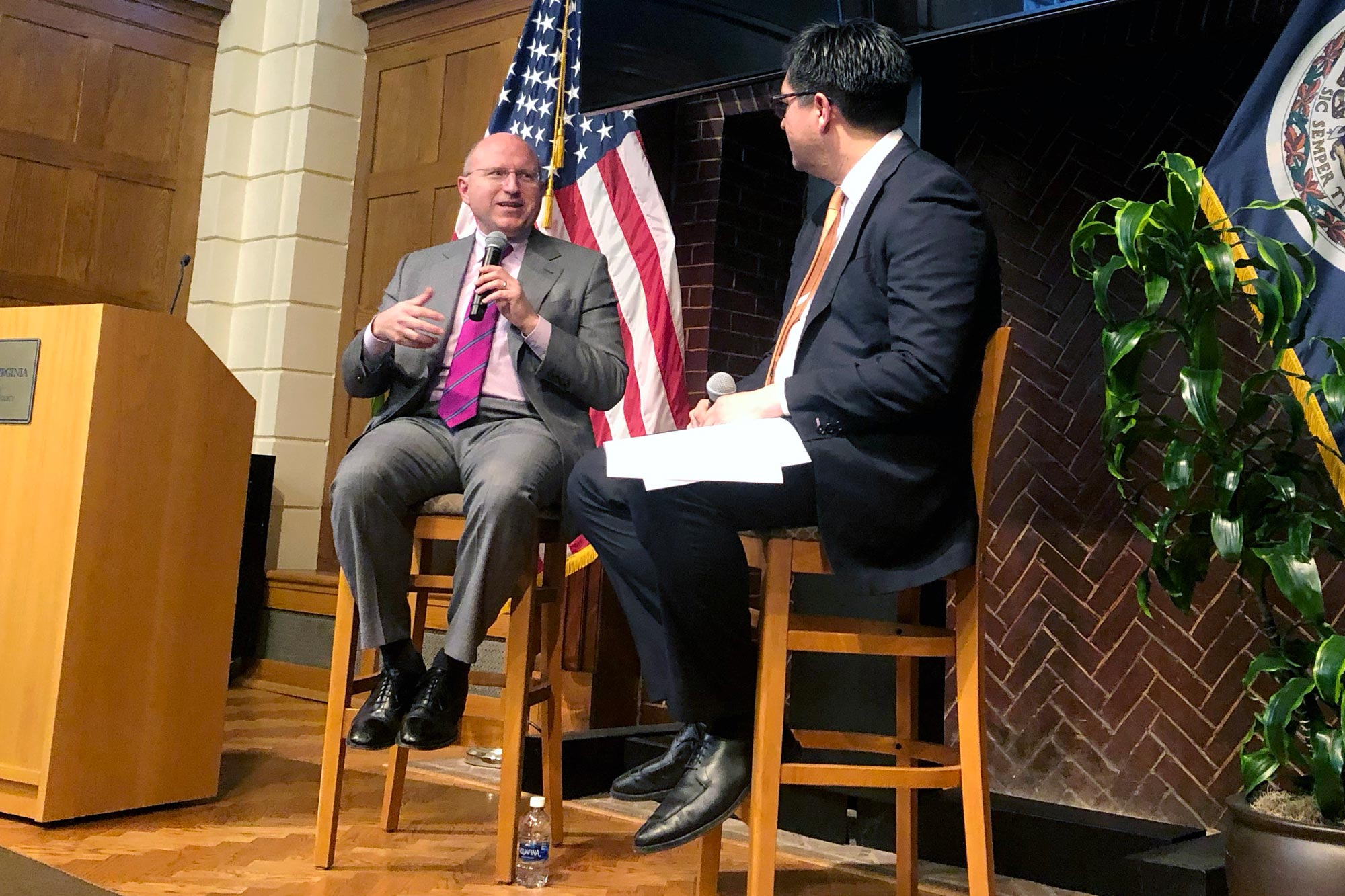When Amazon sent a request around the country for proposals for its new headquarters – a massive project that promised to bring up to 50,000 jobs at the outset – Stephen Moret was only a few months into his tenure as Virginia’s chief economic development official.
He knew the proposal process would be competitive and that tax incentives alone wouldn’t be enough, he said Friday during a talk in Garrett Hall sponsored by the University of Virginia’s School of Continuing and Professional Studies. But he also knew Virginia had two secret weapons: a world-class higher education system and a motivated and trainable workforce.
“While it is true that we ultimately put together something we were really proud of, higher education helped make the difference,” he said.
Moret, the president and CEO of the Virginia Economic Development Partnership, touched on a range of issues during a conversation with SCPS Dean Alex Hernandez, including the Amazon deal, automation and its risks and benefits, how to prepare for careers in a changing workforce, and how best to bring in new employers to Virginia.
But his main theme was clear: the real way to attract top employers is to develop the people they want to hire.
Here are four takeaways from the discussion.
For Amazon and Other Businesses, Talent Sets Virginia Apart
When he was putting together the winning offer for Amazon, Moret knew that if it were simply about offering the most tax incentives, Virginia wasn’t going to get it, he said.
But the state’s excellent set of public universities and their ability to produce computer science graduates was a distinguishing characteristic, he said. The company knew it was going to need a region that could supply the workforce it would need.
“Talent is the biggest driver by far,” he said.
In the end, Amazon selected Virginia for its second headquarters location. That effort included UVA, which is working to increase its footprint in Northern Virginia.
Moret is now launching the Virginia Talent Accelerator Program in partnership with the Virginia Community College System to create customized training programs such that employers moving into the commonwealth have a pipeline of talent to hire on day one.
Virginia Has a Strategy for Growing Rural Economies
One of the challenges in Moret’s line of work is finding ways to bring employers to the rural parts of the state that have seen the biggest losses of both jobs and population. A state can show employment gains year-over-year by focusing on urban centers, but those are not the only regions that need to attract new employers.
Today, Virginia’s rural localities are in competition with other regions for potential employers. But the gains required to make a difference are also more achievable there, he said.
“If you subdivide Virginia into its regions – and we often look at 19 distinct areas – the number of jobs required to go from losses to growth is only a couple hundred jobs per year in rural regions,” he said.
There’s no magic bullet, but a number of initiatives are underway to help bridge that divide, he said, including potential efforts at the University of Virginia’s College at Wise.
Help People Navigate the Education They Need to Thrive in a Digital Economy
There’s been a lot said about the challenges that a coming wave of technological automation will bring to the workforce, Moret said. But there’s no one type of degree that best insulates people from those challenges.
STEM degrees, including those in fields like computer science, are attractive to many companies, which often struggle to fill technical positions. But those same companies hire graduates from liberal arts programs all the time, he said, and those students often excel in so-called “soft skills” – communication, responsiveness, adaptability.
Regardless of their area of study, UVA students preparing for the workforce should seek out research opportunities, internships and other training that will expose them to the nature of the work they want to do, in addition to curricular offerings, he said.
“Treat career development like it’s a class of its own,” he said.
Virginia’s Colleges, Including UVA, Have a Big Role to Play In Attracting Employers
Education is key to workforce development, and Moret spoke highly of the quality of UVA graduates and of initiatives such as the launch of the School of Data Science, which he said is a great example of a university anticipating the needs of a future workforce.
He was also quick to point out that, although education and training are key to job growth, they are not limited to two-year, four-year and post-baccalaureate programs. Adult learners, people who enroll in certificate or training programs, and others also benefit from adding new skills that are attractive to employers.
“We need to help people, particularly first-generation students and adult learners, to navigate these options, whether it’s for a degree or a credential,” he said.
The University of Virginia School of Continuing and Professional Studies helps working adults finish their degrees and advance their careers. SCPS offers online and in-person programs, bringing high-quality, accessible and affordable education to all Virginians.
Media Contact
Article Information
December 17, 2019
/content/after-amazon-secret-bringing-more-businesses-and-jobs-virginia-its-people

